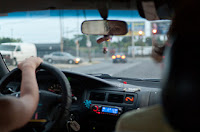Criminals rarely put real thought into assault and other crimes. Almost never is their violence "person specific." They are looking for vulnerability, an "easy mark," someone who is not aware of their surroundings. A well rehearsed plan of action can take you and your family off the target list.
HOME SAFETY TIPS
 |
| Photo by Jeremy Levine Design |
- A constant awareness of your environment is the best weapon for guarding your personal safety. Always be alert to your surroundings, whether in your car, on the street or at home.
- Always have a plan of action. Play a mental game of "what if…", where you would go and what you would do, should a dangerous situation occur.
- Trust your instincts. Research shows that a large percentage of people who have been assaulted, had a feeling something was wrong just before they were attacked.
- Over half of all assaults are committed by someone known to the victim. Take notice if an acquaintance is paying unwanted attention to you.
- Don't wear headphones for radios or other devices that would make it difficult for you to hear an attacker. Be alert at all times.
- If someone accosts you, yell "Fire" instead of "Help" or "Rape," because more people are likely to respond.
- Be sure to shout that you do not know the assailant, so bystanders do not mistake the encounter for a domestic quarrel.
AUTO / TRAVEL SAFETY TIPS
 |
| Photo by Matt Kowal |
- Keep your vehicle in good running order. Routine maintenance and replacement of worn parts in a timely manner will significantly decrease the possibility of breakdowns when you're not prepared.
- Consider having a cellular phone in your vehicle. Often this is the quickest and safest means of alerting the police and emergency services that you are in need of assistance.
- If your travel plans include an overnight or long-distance driving, make sure you leave an itinerary of your trip with friends or family, to let them know where you will be staying, including phone numbers of hotels, etc.
- Plan road trips carefully. Consider weather and driving conditions in relation to the condition of your automobile. Carry maps and familiarize yourself with the route you will travel before you leave.
- Have an emergency kit, including a working flashlight and jumper cables, in the car at all times. Take a first-aid kit and emergency blanket, too.
- Often a "Send Help" or "Please Call Police" sign for your windshield can be a valuable item if you are not able to get your vehicle going.
CAMPUS SAFETY TIPS
 |
| Photo by US Department of Education |
- Learn what help campus security can offer to increase your safety. If their services are only available in certain areas or if they do not patrol some portions of the campus at regular intervals, learn where those areas are.
- Most campuses have excellent provisions for lighting the most traveled paths after dark. Stick to these.
- Often the security for each dormitory is lax, if it exists at all. Make sure that you keep your room locked at all times.
- Consider registering your more valuable items with the campus security, to make identification easy.
- Let a roommate or a friend know where you are going and how long you may be gone, when you leave campus.
- Always enlist the company of at least one other person when jogging or exercising outside.
- Do not wear headphones as they can seriously impair your ability to predict and avoid a confrontation.
Source: Mace Security International
Of course, we would also want to mention, that it's important for you to carry a self defense product when you are at home, traveling, on campus or in any other place you might need some protection! We carry the Mace brand, along with a few other self defense brands, as well.
No comments:
Post a Comment